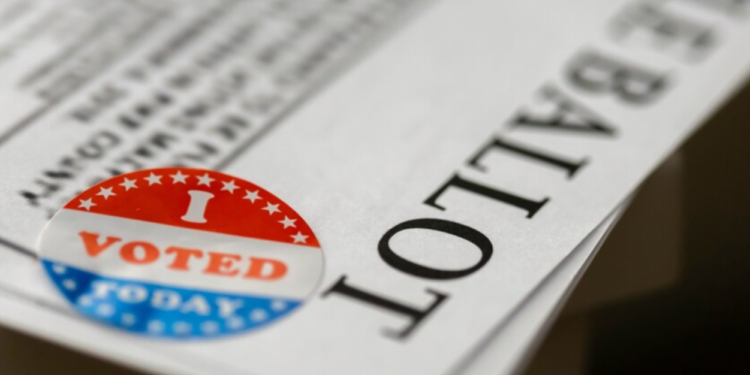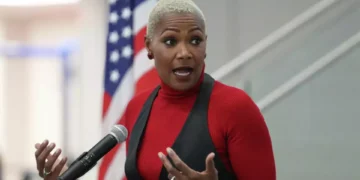March 26, 2025 Story by: Editor
MADISON, Wis. (AP) — While much attention has been focused on the high-stakes Wisconsin Supreme Court race leading up to the April 1 election, it is not the only issue voters will decide as early voting begins Tuesday.
Voters will also cast their ballots in a race for the state’s top education official, who will shape K-12 policies during President Donald Trump’s second term. Additionally, a proposal to enshrine the state’s voter ID law into the Wisconsin Constitution is on the ballot.
Although these issues have seen clear partisan divides, they have received far less national attention and funding compared to the Supreme Court race.
Education Race: Union-Backed Incumbent vs. GOP-Endorsed Challenger
The contest for state superintendent of education features incumbent Jill Underly, who is supported by the state teachers’ union, against Brittany Kinser, a consultant backed by Republicans and a proponent of private school voucher programs.
A third candidate was eliminated in the February primary, failing to gain enough support to challenge Underly. Following her victory, the state teachers’ union, which had not endorsed anyone during the primary, officially backed Underly.
Underly began her education career in 1999 as a high school social studies teacher in Indiana before moving to Wisconsin in 2005. She spent five years at the state education department and later worked as a principal at Pecatonica Elementary School. Kinser, on the other hand, left Rocketship in 2022 to join City Forward Collective, a Milwaukee-based nonprofit advocating for charter and voucher schools. That same year, she also established a consulting firm where she currently works.
Wisconsin is unique in that it is the only state where the top education official is elected rather than appointed, and there is no state board of education. This gives the head of the Department of Public Instruction significant authority over education policy, including school funding distribution and teacher licensing.
Key Issues: Voucher Schools and Education Funding
Kinser has criticized Underly’s leadership, particularly her overhaul of state achievement standards last year. Underly defended the changes, stating they better align with current student learning, but the move faced bipartisan pushback, including from Democratic Gov. Tony Evers, who served as state superintendent before becoming governor in 2018. Evers has not taken a position in the race.
Kinser argues that the revised standards have lowered expectations for students and made it harder to assess school and district performance over time.
Underly, who won the state superintendent position in 2021, has the backing of the Wisconsin Education Association Council, the state’s teachers’ union, along with the Wisconsin Democratic Party and several Democratic leaders.
Kinser, endorsed by the Wisconsin Republican Party, highlights her experience as a public school principal in her first TV ad—though she omits the fact that it was a charter school. She previously served as the executive director of Rocketship schools in Milwaukee, part of a national charter school network.
Underly has painted Kinser as a lobbyist uninterested in public education. Kinser supports Wisconsin’s private school voucher and charter school programs, which Underly and many Democrats oppose, arguing they divert funding from public schools.
“Instead of fighting for students, Kinser is standing with the far-right politicians who are trying to rip resources away from our schools,” Underly said.
Underly has also raised concerns about the potential elimination of the U.S. Department of Education, making it a campaign issue.
While Underly opposes dismantling the agency, Kinser has taken a pragmatic stance, stating, “As long as the state continues to receive federal education funding, I am confident in our ability to navigate whatever changes Washington sends our way.”
Voter ID Law Amendment on the Ballot
Another major issue in the election is a proposal to elevate Wisconsin’s photo ID voting requirement from state law to a constitutional amendment.
Even if voters reject the amendment, the voter ID law—first enacted in 2011—will remain in place. It did not go into permanent effect until 2016 due to multiple legal challenges.
Republicans have pushed for the constitutional amendment, arguing it would strengthen election security and prevent courts from overturning the law.
Democrats, however, contend that photo ID requirements disproportionately impact voters of color, individuals with disabilities, and low-income residents by making it harder for them to cast ballots.
If approved, the amendment would make it more challenging for a future Democratic-controlled legislature to repeal the voter ID law, which they have long opposed. To be enacted, any constitutional amendment must pass two consecutive legislative sessions and receive voter approval in a statewide referendum. Wisconsin is among nine states with strict photo ID voting requirements, according to the National Conference of State Legislatures. Nationwide, 36 states have laws requiring or requesting some form of identification at the polls.
Source: AP News

















